高中英语语法(全英详细讲解)
【语法讲解】高中英语--名词性从句专题讲解(详细)

Manypeoplebelievethatrobotswilldo most of our work.
whether/if引导的宾语从句
1)可用whether/if的情况
whether/if常放在ask, care, wonder, find out等后引导宾语从句。whether/if在从句中不作成分,但是有“是否”含义,不可省略。
It occurred to me that we should get in touch with the manager.
whether/if引导的主语从句
whether引导的主语从句即可以放在句首,也可以放在句末,但if引导的主语从句只能放在句末,前面需用it作形式主语。whether,if只起连句中不作成分,且不可省略。
Iaskedthem whether/if they would win the match.
Do you care whether/if you win?
2)只用whether不用if的情况
引导介词后的宾语从句时。
Itdepends on whether it will snow tomorrow.
Wedoubt whether he will keep his promise.
宾语从句前置,置于句首时。
Whetherthey can come here on time, we don’t know.
连接代词或连接副词引导的主语从句
1)连接代词what, who, whom, , whose, which , whatever, whoever, whichever等在从句中作主语、宾语、表语、定语,不可以省略。
高中英语语法基础知识总结大全
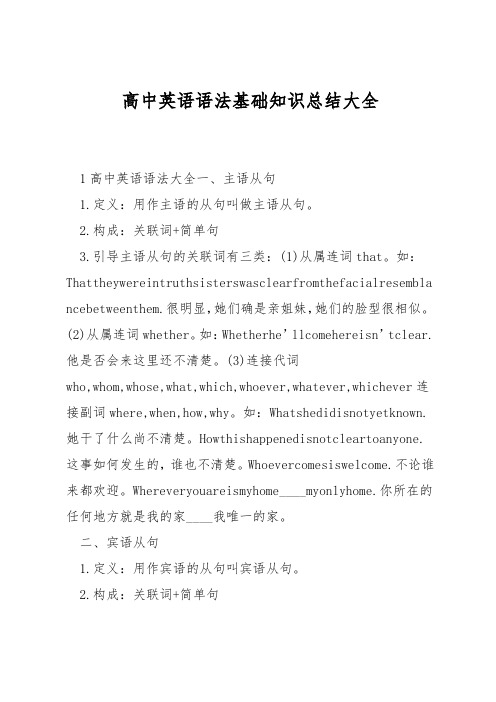
高中英语语法基础知识总结大全1高中英语语法大全一、主语从句1.定义:用作主语的从句叫做主语从句。
2.构成:关联词+简单句3.引导主语从句的关联词有三类:(1)从属连词that。
如:Thattheywereintruthsisterswasclearfromthefacialresembla ncebetweenthem.很明显,她们确是亲姐妹,她们的脸型很相似。
(2)从属连词whether。
如:Whetherhe’llcomehereisn’tclear.他是否会来这里还不清楚。
(3)连接代词who,whom,whose,what,which,whoever,whatever,whichever连接副词where,when,how,why。
如:Whatshedidisnotyetknown.她干了什么尚不清楚。
Howthishappenedisnotcleartoanyone.这事如何发生的,谁也不清楚。
Whoevercomesiswelcome.不论谁来都欢迎。
Whereveryouareismyhome____myonlyhome.你所在的任何地方就是我的家____我唯一的家。
二、宾语从句1.定义:用作宾语的从句叫宾语从句。
2.构成:关联词+简单句3.引导宾语从句的关联词有三类:(1)从属连词that。
如:Hetoldusthathefeltill.他对我们说他感到不舒服。
Iknowhehasreturned.我知道他已经回来了。
注:that在引导宾语从句时也并不是任何情况下都可以省略。
在以下情况下,that不能省略。
1.EverybodycouldseewhathappenedandthatTomwasfrightened. (and连接两个宾语从句,that宾语从句放在and的后面时,that 不能省略。
)大家都会看出所发生的事情并知道Tom非常害怕。
2.Iknownothingabouthimexceptthatheisfromthesouth.(that 引导的宾语从句作介词宾语时,that不能省略。
高中英语语法大全全课件非常详细(561张PPT)PPT课件

Two teas, please. 请来两杯茶。
d. 抽象名词有时也可数。
four freedoms 四大自由
the four modernizations 四个现代化
many interests 许多兴趣
精选PPT课件
15
精选PPT课件
16
问题1
The ______ is just around the corner and you won’t miss it. (01北京春季)
有些抽象名词和物质名词也可转化为可数名词,用
来表示某种特定的意义。a knowledge of …表示
“对……有所了解“。又如:
This meeting is a great success.
请看下面的可数与不可数名词的转化:Βιβλιοθήκη 精选PPT课件14
a. 当物质名词转化为个体名词时。
Cake is a kind of food. 蛋糕是一种食物。 (U)
A. a four hour C. a four-hours
B. a four hour's
✓D. a four hours'
精选PPT课件
18
问题3: There are only twelve _____ in the hospital.
✓ A.woman doctors B.women doctors
大多数不可数名词都不可能转化为可数名词,常
见的有:information; news; advice; progress;
fun ……如:
This is not a match. We’re playing chess for _____.
✓ A habit B hobby C fun D game (2001上海春季)
(完整版)高中英语语法讲解与练习
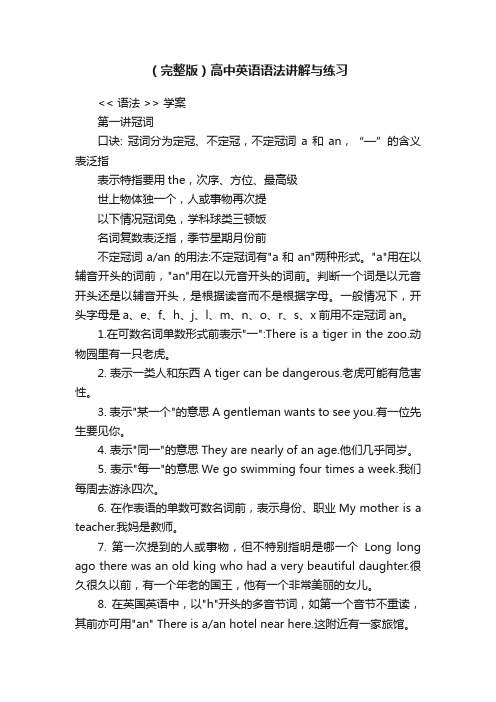
(完整版)高中英语语法讲解与练习<< 语法 >> 学案第一讲冠词口诀: 冠词分为定冠、不定冠,不定冠词a和an,“—”的含义表泛指表示特指要用the,次序、方位、最高级世上物体独一个,人或事物再次提以下情况冠词免,学科球类三顿饭名词复数表泛指,季节星期月份前不定冠词a/an的用法:不定冠词有"a和an"两种形式。
"a"用在以辅音开头的词前,"an"用在以元音开头的词前。
判断一个词是以元音开头还是以辅音开头,是根据读音而不是根据字母。
一般情况下,开头字母是a、e、f、h、j、l、m、n、o、r、s、x前用不定冠词an。
1.在可数名词单数形式前表示"一":There is a tiger in the zoo.动物园里有一只老虎。
2. 表示一类人和东西 A tiger can be dangerous.老虎可能有危害性。
3. 表示"某一个"的意思A gentleman wants to see you.有一位先生要见你。
4. 表示"同一"的意思They are nearly of an age.他们几乎同岁。
5. 表示"每一"的意思We go swimming four times a week.我们每周去游泳四次。
6. 在作表语的单数可数名词前,表示身份、职业My mother is a teacher.我妈是教师。
7. 第一次提到的人或事物,但不特别指明是哪一个Long long ago there was an old king who had a very beautiful daughter.很久很久以前,有一个年老的国王,他有一个非常美丽的女儿。
8. 在英国英语中,以"h"开头的多音节词,如第一个音节不重读,其前亦可用"an" There is a/an hotel near here.这附近有一家旅馆。
高中英语语法大全(详细)
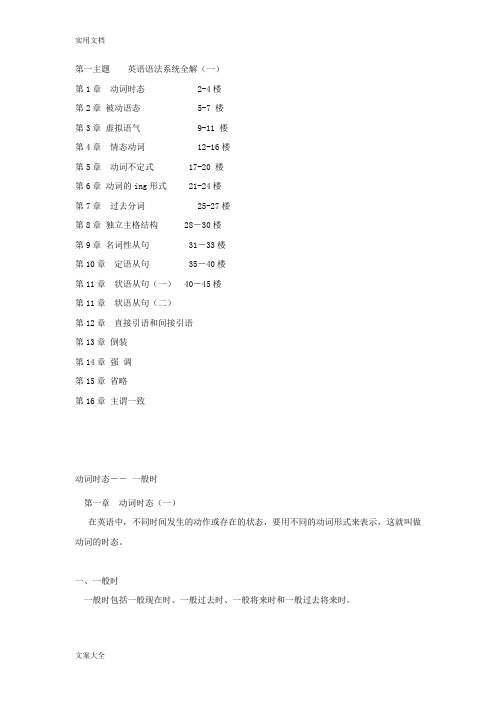
第一主题英语语法系统全解(一)第1章动词时态 2-4楼第2章被动语态 5-7 楼第3章虚拟语气 9-11 楼第4章情态动词 12-16楼第5章动词不定式 17-20 楼第6章动词的ing形式 21-24楼第7章过去分词 25-27楼第8章独立主格结构 28-30楼第9章名词性从句 31-33楼第10章定语从句 35-40楼第11章状语从句(一) 40-45楼第11章状语从句(二)第12章直接引语和间接引语第13章倒装第14章强调第15章省略第16章主谓一致动词时态--一般时第一章动词时态(一)在英语中,不同时间发生的动作或存在的状态,要用不同的动词形式来表示,这就叫做动词的时态。
一、一般时一般时包括一般现在时、一般过去时、一般将来时和一般过去将来时。
A.一般现在时1.一般现在时的构成一般现在时主要用动词原形来表示。
主语是第三人称单数时,动词后面要加-s或-es。
“我’为开头做称呼的是第一人称‘你’怎么怎么样是第二人称‘他她它’是第三人称第三人称就是第三人称转述。
例:小兰对妈妈说:“我要出去玩了”第三人称:小兰对妈妈说,她要出去玩了。
第三人称,就是说是叙述性质的,没有人的语言,是旁白在记叙!以我的角度说,就是第一人称;以和你说的角度说,就是第二人称;站在事情外说事情,他怎么怎么样,那就是第三人称了They want good jobs.他们想要好的工作。
The coat matches the dress.外衣和裙子很相配。
This work does not satisfy me.这项工作我不满意。
Do you understand?你懂了吗?2.一般现在时的用法①一般现在时的基本用法a. 表示现在习惯性的动作或存在状态He always takes a walk after supper.晚饭后他总是散散步。
Everyone is in high spirits now.现在大家都情绪高涨。
b. 表示客观事实或普遍真理The sun rises in the east and sets in the west.太阳从东方升起在西方落下。
【语法讲解】高中英语--状语从句专题讲解(详细)

主句如果是否定句,则此时主句谓语动词用非延续性动词,表示主句的动作从从句表示的时间点才开始,即“直到…才…”
Ididn’t knowanything about it until you told me(否定句,谓语为非延续性动词)
2)主句是肯定句时
主句如果是肯定句,则此时主句谓语动词用延续性动词,表示主句的动作直到从句表示的时间点就结束,即“直到…为止”。
No sooner had he reached home than it began to rain.
= He had no sooner reached home than it began to rain.
Hardly had I told him the news when he stopped listening.
=I hardly told him the news when he stopped listening.
地点状语从句
地点状语从句的引导词有when和wherever。
where, wherever指具体地点时,从句可用于主句之前或之后;
where, wherever表示抽象概念的含义时,从句需放在主句前。
While wewere waiting forthe bus, it was raining heavily.(延续性)
while和as常表示从句的动作与主句的动作同时发生,而when表示从句的动作发生在主句动作之前、之后,也可同时发生。
Theyrushed inwhile/as wewere discussingproblems.(同时发生)
2)从句谓语动词不同,表达的意义不同。
since引导的从句谓语如果是延续性动词或表示状态的动词,则从句表示的时间是从该动作或状态结束时算起。
高中英语八大语法全解析
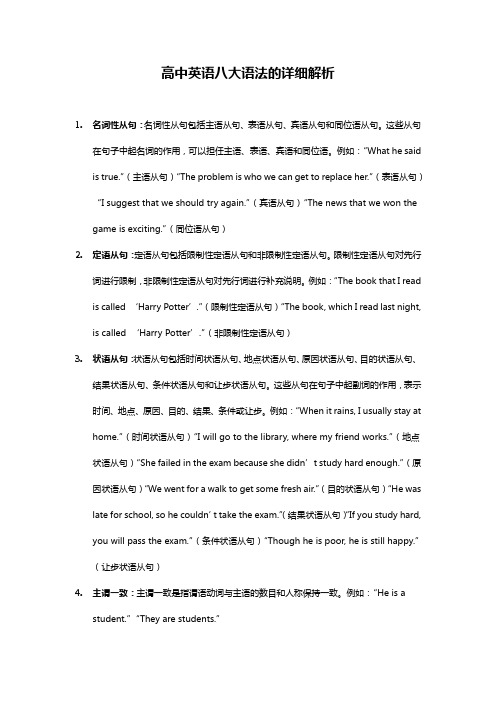
高中英语八大语法的详细解析1.名词性从句:名词性从句包括主语从句、表语从句、宾语从句和同位语从句。
这些从句在句子中起名词的作用,可以担任主语、表语、宾语和同位语。
例如:“What he said is true.”(主语从句)“The problem is who we can get to replace her.”(表语从句)“I suggest that we should try again.”(宾语从句)“The news that we won the game is exciting.”(同位语从句)2.定语从句:定语从句包括限制性定语从句和非限制性定语从句。
限制性定语从句对先行词进行限制,非限制性定语从句对先行词进行补充说明。
例如:“The book that I read is called ‘Harry Potter’.”(限制性定语从句)“The book, which I read last night, is called ‘Harry Potter’.”(非限制性定语从句)3.状语从句:状语从句包括时间状语从句、地点状语从句、原因状语从句、目的状语从句、结果状语从句、条件状语从句和让步状语从句。
这些从句在句子中起副词的作用,表示时间、地点、原因、目的、结果、条件或让步。
例如:“When it rains, I usually stay at home.”(时间状语从句)“I will go to the library, where my friend works.”(地点状语从句)“She failed in the exam because she didn’t study hard enough.”(原因状语从句)“We went for a walk to get some fresh air.”(目的状语从句)“He was late for school, so he couldn’t take the exam.”(结果状语从句)“If you study hard, you will pass the exam.”(条件状语从句)“Though he is poor, he is still happy.”(让步状语从句)4.主谓一致:主谓一致是指谓语动词与主语的数目和人称保持一致。
(完整版)高中英语语法虚拟语气讲解

高中英语语法讲解--虚拟语气1。
语气的定义和种类(1)语气的定义语气是动词的一种形式,它表示说话人对某一行为或事情的看法和态度。
(2)语气的种类A. 陈述语气表示动作或状态是现实的、确定的或符合事实的,用于陈述句、疑问句和某些感叹句。
We are not ready.Did it rain all day yesterday?What a fine day today!B. 祈使语气表使说话人的建议、请求、邀请、命令等。
Be careful.Don’t forget to clo se the window.Open the door, please。
C。
虚拟语气表使动作或状态不是客观存在的事实,而是说话人的主观愿望、假设或推测等.2。
虚拟语气一. 虚拟语气在条件句中的应用学习虚拟语气在条件句中的用法之前我们必须清楚条件句的种类:条件句有真实条件句与非真实条件句(或称虚拟条件句)两种。
真实条件句所表的假设是可能发生或实现的,句中的条件从句与结果主句都用陈述语气。
如:If it doesn’t rain tomorrow, I will go for a picnic。
假若明天不下雨,我就去野餐.Oil floats if you pour it on water. 你如把油倒在水里,油就浮起来。
虚拟条件句所表的假设则是不可能或不大可能发生或实现的,句中的条件从句与结果主句皆须用虚拟语), 主句的谓语用should (would, might, could)+动词原形。
如:If it were not raining, we should go for a picnic.如果现在不下雨的话,我们就出去野餐了。
(事实是:天在下雨,我们不能出去野餐.表示愿望。
)If he came here, he might be able to help you. 如果他来这,他就能够帮助你了。
(事实是:他没来这,他不可能帮助你。
高中英语语法一般过去时详细讲解
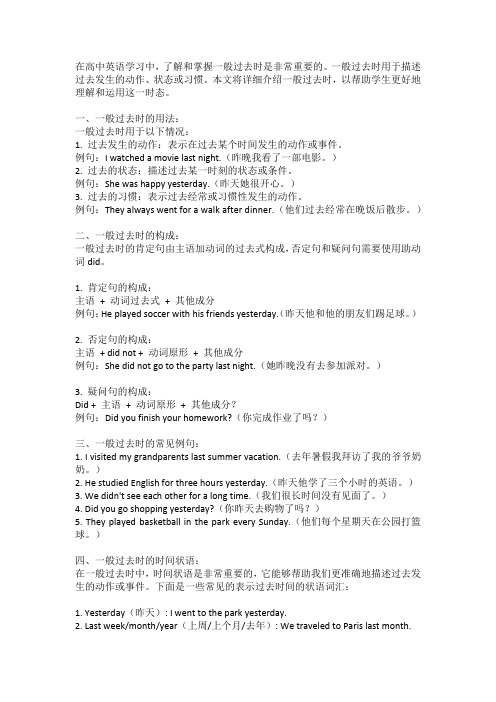
在高中英语学习中,了解和掌握一般过去时是非常重要的。
一般过去时用于描述过去发生的动作、状态或习惯。
本文将详细介绍一般过去时,以帮助学生更好地理解和运用这一时态。
一、一般过去时的用法:一般过去时用于以下情况:1. 过去发生的动作:表示在过去某个时间发生的动作或事件。
例句:I watched a movie last night.(昨晚我看了一部电影。
)2. 过去的状态:描述过去某一时刻的状态或条件。
例句:She was happy yesterday.(昨天她很开心。
)3. 过去的习惯:表示过去经常或习惯性发生的动作。
例句:They always went for a walk after dinner.(他们过去经常在晚饭后散步。
)二、一般过去时的构成:一般过去时的肯定句由主语加动词的过去式构成,否定句和疑问句需要使用助动词did。
1. 肯定句的构成:主语+ 动词过去式+ 其他成分例句:He played soccer with his friends yesterday.(昨天他和他的朋友们踢足球。
)2. 否定句的构成:主语+ did not + 动词原形+ 其他成分例句:She did not go to the party last night.(她昨晚没有去参加派对。
)3. 疑问句的构成:Did + 主语+ 动词原形+ 其他成分?例句:Did you finish your homework?(你完成作业了吗?)三、一般过去时的常见例句:1. I visited my grandparents last summer vacation.(去年暑假我拜访了我的爷爷奶奶。
)2. He studied English for three hours yesterday.(昨天他学了三个小时的英语。
)3. We didn't see each other for a long time.(我们很长时间没有见面了。
(完整)高中英语语法之现在完成时

现在完成时讲解一、基本结构:主语+have/has+过去分词(done)①肯定句:主语+have/has+过去分词+其他②否定句:主语+have/has+not+过去分词+其他③一般疑问句:Have/Has+主语+过去分词+其他④特殊疑问句:特殊疑问词+一般疑问句(have/has+主语+过去分词+其他)二、用法1)现在完成时的"完成用法"现在完成时用来表示现在之前已发生过或完成的动作或状态,但其结果却和现在有联系,也就是说,动作或状态发生在过去但它的影响现在还存在.He has turned off the light.他已把灯关了。
(动作结束于过去,但说明的是现在的情况--灯现在不亮了。
)I have spent all of my money.(含义是:现在我没有钱花了.)Jane has laid the table.(含义是:现在桌子已经摆好了.)2)现在完成时的"未完成用法"指的是动作开始于过去某一时刻,一直延续到现在,或可能还要继续下去。
这里的动词要用持续性动词。
常与for (+时间段),since(+时间点)连用.Mary has been ill for three days.Mary has been ill since three days ago.注意:1.现在完成时不能单独与准确时间连用,(如表示过去的时间状语)如yesterday(morning、afternoon),last(morning、afternoon)等,除非与for, since连用.2.现在完成时往往同表示不确定的过去时间状语连用,如already(肯定), yet(否定,疑问), just, before, recently, still, latel y等:He has already obtained a scholarship.I haven't seen much of him recently (lately).We have seen that film before.Have they found the missing child yet ?3. 现在完成时常常与表示频度的时间状语连用,如ever, never, twice, several times等:Have you ever been to BeijingI have never heard Bunny say anything against her.I have used this pen only three times. It is still good.George has met that gentleman several times.4. 现在完成时还往往可以同包括现在时间在内的时间状语连用,如up to these few days/weeks/months/years, just, up to present(now), so far等:Peter has written six papers so far.Up to the present everything has been successful.5. 现在完成时还可以用来表示过去的一个时间到现在这段时间内重复发生的动作.We have had four texts this semester.6. have been to 和have gone to的区别have been to 强调“去过”,现已不在那里,如:He has been to the USA three times.他到美国去过三次。
高中英语语法

高中英语语法(一)被动语态动词的语态主要分为两种:主动语态与被动语态主动语态指主语是谓语功作的执行者,则为主动关系。
被动语态指主语是谓语动作的承受者,则为被功关系。
I have done the job.(主动句)The job has been done.(被动句)1.被动语态根据时态的不同,可分为以下几种类型:一般现在时:am/is/are+done;一般过去时:was/were+done现在进行时:am/is/are+being done过去进行时:was/were+being done将来时:will/would+be done,be going to be done, be to be done现在完成时:have/has +been done过去完成时:had+been done将来完成时:will+have been done2被动语态门主功语态一样具有不同时态,其时态的变化取决于时间状语,其时态的变化形式由其助动词be的事态变化形式来体现The house is being painted now.(现在进行时被动语态)Eru0ugh has been said to him about it.(现在完成时被动语态)The furniture was bought last week..(过去时被动语态)Youll be punished one day.(将来时被动语态)3.被动语态的意义(1)不知道或没必要指出行为、动作的执行者(无须加buy 短语)Colour TV sets are sold in that shop.Football is plated all over the world.(2)突出和强调行为或动作的承受着。
History is made by the people.The wounded soldiers have been saved by those people.(3)有时主语较长,可后置。
高中英语语法(全英详解)
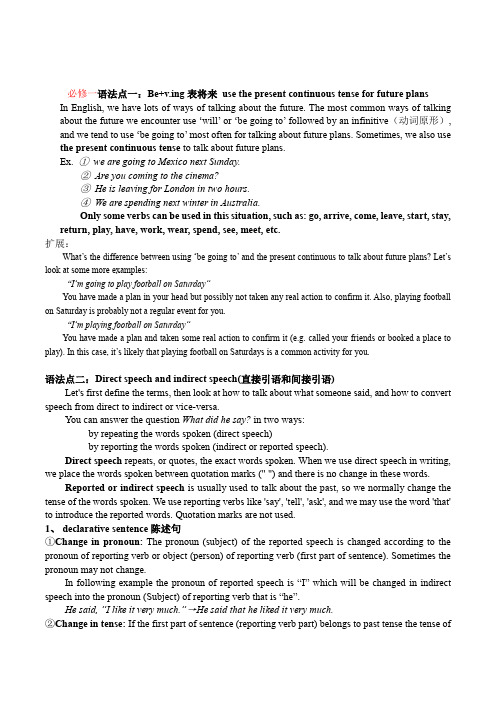
必修一语法点一:Be+v.ing表将来use the present continuous tense for future plans In English, we have lots of ways of talking about the future. The most common ways of talking about the future we encounter use ‘will’ or ‘be going to’ followed by an infinitive(动词原形), and we tend to use ‘be going to’ most often for talking about future pl ans. Sometimes, we also use the present continuous tense to talk about future plans.Ex. ①we are going to Mexico next Sunday.②Are you coming to the cinema?③He is leaving for London in two hours.④We are spending next winter in Australia.Only some verbs can be used in this situation, such as: go, arrive, come, leave, start, stay, return, play, have, work, wear, spend, see, meet, etc.扩展:What’s the difference between using ‘be going to’ and the present continuous to talk about future plans? Let’s look at some more examples:“I’m going to play football on Saturday”You have made a plan in your head but possibly not taken any real action to confirm it. Also, playing football on Saturday is probably not a regular event for you.“I’m playing football on Saturday”You have made a plan and taken some real action to confirm it (e.g. called your friends or booked a place to play). In this case, it’s likely that playing football on Saturdays is a common activity for you.语法点二:Direct speech and indirect speech(直接引语和间接引语)Let's first define the terms, then look at how to talk about what someone said, and how to convert speech from direct to indirect or vice-versa.You can answer the question What did he say? in two ways:by repeating the words spoken (direct speech)by reporting the words spoken (indirect or reported speech).Direct speech repeats, or quotes, the exact words spoken. When we use direct speech in writing, we place the words spoken between quotation marks (" ") and there is no change in these words.Reported or indirect speech is usually used to talk about the past, so we normally change the tense of the words spoken. We use reporting verbs like 'say', 'tell', 'ask', and we may use the word 'that' to introduce the reported words. Quotation marks are not used.1、declarative sentence陈述句①Change in pronoun: The pronoun (subject) of the reported speech is changed according to the pronoun of reporting verb or object (person) of reporting verb (first part of sentence). Sometimes the pronoun may not change.In following example the pronoun of reported speech is “I” which will be changed in indirect speech into the pronoun (Subject) of reporting verb that is “he”.He said, “I like it very much.”→He said that he liked it very much.②Change in tense: If the first part of sentence (reporting verb part) belongs to past tense the tenseof reported speech will change. If the first part of sentence (reporting verb part) belongs to present or future tense, the tense of reported speech will not change.③Change in demonstrative pronoun指示代词, temporal adverbial时间状语, adverbial of place地点状语and verbs.Ps:(1)if the direct speech indicates objective truth, then there is no change in tense when it’sconverted to indirect speech.Ex. He said, “Light travels much faster than sound.”→He said that light travels much faster than sound.(2) 如果在当地转述,here不必改成there,come不必改为go,如果在当天转述,yesterday, tomorrow等时间状语也不必改变。
【语法讲解】高中英语--虚拟语气专题讲解(详细)
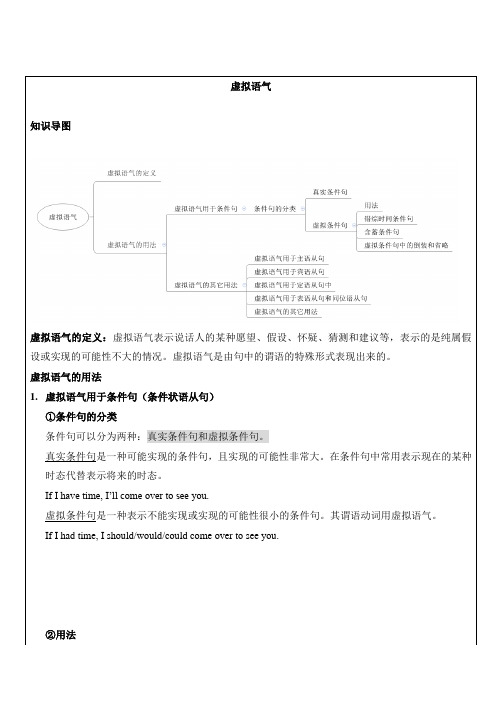
虚拟语气
知识导图
虚拟语气的定义:虚拟语气表示说话人的某种愿望、假设、怀疑、猜测和建议等,表示的是纯属假设或实现的可能性不大的情况。
虚拟语气是由句中的谓语的特殊形式表现出来的。
虚拟语气的用法
1.虚拟语气用于条件句(条件状语从句)
①条件句的分类
条件句可以分为两种:真实条件句和虚拟条件句。
真实条件句是一种可能实现的条件句,且实现的可能性非常大。
在条件句中常用表示现在的某种时态代替表示将来的时态。
If I have time, I’ll come over to see you.
虚拟条件句是一种表示不能实现或实现的可能性很小的条件句。
其谓语动词用虚拟语气。
If I had time, I should/would/could come over to see you.
②用法。
主谓一致高中英语语法与短语

主谓一致高中英语语法与短语主谓一致高中英语语法一主谓一致概念一、主谓一致概念:主谓一致,即谓语动词的单复数要和主语保持一致。
一般来说,如果主语是单数形式,那么谓语动词要用单数;如果主语是复数形式,那么谓语动词要用复数。
但是,也会出现一些特殊情况,这就是我们要总结的。
二主谓一致类型1. 不可数名词看成单数,因此谓语动词要用单数形式。
不可数名词有很多,比如空气、水、重量、长度、金钱等等。
(1) Ten thousand dollars is quite a large sum.(2) About 20 percent of the work was done yesterday.第一个句子里,钱即使再多,也只是一笔数目,所以看成单数;第二个句子里,work是不可数的,这个要注意,在英语里,我们把job看成可数名词,但是work看成不可数名词,不可数名词的前提下,不论讲它的几分之几,还是百分之多少,都仍然是不可数。
2. 主语从句看成单数。
That they were wrong in these matters is now clear to us all.这句话里有两个动词,一个是were,另一个是is,一个句子只能有一个动词,所以这里肯定嵌入了一个从句,我们会发现That they were wrong in these matters是个整体,充当整个句子里的主语,所以是主语从句。
我们把主语从句看成单数,所以这里用的is。
3. 就前原则就前原则,指的是动词单复数看这个词前面的名词单复数情况。
as well as, with, along with, together with都遵循就前原则。
具体我们来看以下例句:(1) E-mail, as well as telephones, plays an important part in daily munication.(2) A library with five thousand books is offered to the nation as a gift.第一句话的意思是邮件和电话在日常沟通中有重要作用。
(精华版)高中英语语法讲解汇总
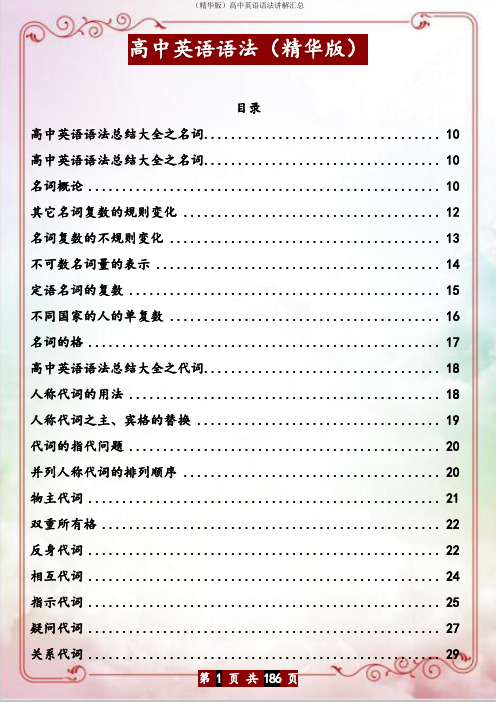
高中英语语法(精华版)目录高中英语语法总结大全之名词 (10)高中英语语法总结大全之名词 (10)名词概论 (10)其它名词复数的规则变化 (12)名词复数的不规则变化 (13)不可数名词量的表示 (14)定语名词的复数 (15)不同国家的人的单复数 (16)名词的格 (17)高中英语语法总结大全之代词 (18)人称代词的用法 (18)人称代词之主、宾格的替换 (19)代词的指代问题 (20)并列人称代词的排列顺序 (20)物主代词 (21)双重所有格 (22)反身代词 (22)相互代词 (24)指示代词 (25)疑问代词 (27)关系代词 (29)every, no, all, both,... (30)none, few, some, any,... (32)代词比较辩异one, that和it (34)one/another/the other (34)"the"的妙用 (35)anyone/any one;... (35)both, either, neither,... .. (36)many, much (37)few, little, a few,... .. (38)高中英语语法总结大全之冠词和数词 (39)不定冠词的用法 (39)定冠词的用法 (40)零冠词的用法 (41)冠词与形容词+名词结构 (43)冠词位置 (43)数词 (44)形容词及其用法 (46)以-ly结尾的形容词 (46)用形容词表示类别和整体 (47)多个形容词修饰名词的顺序 (47)副词及其基本用法 (49)兼有两种形式的副词 (50)形容词与副词的比较级 (51)as+形容词或副词原级+as (53)比较级形容词或副词+than (54)可修饰比较级的词 (55)many, old和far (56)the+最高级+比较范围 (56)和more有关的词组 (57)高中英语语法总结大全之动词 (58)动词 (58)系动词 (60)助动词be的用法 (63)助动词have的用法 (64)助动词do 的用法 (65)助动词shall和will的用法 (66)助动词should, would的用法 (66)短语动词 (67)非谓语动词 (68)高中英语语法总结大全之动词的时态 (69)一般现在时的用法 (69)一般过去时的用法 (70)used to/be used to (71)一般将来时 (72)be going to/will (73)be to和be going to (73)一般现在时表将来 (73)用现在进行时表示将来 (74)现在完成时 (74)比较过去时与现在完成时 (74)用于现在完成时的句型 (76)比较since和for (78)since的四种用法 (79)延续动词与瞬间动词 (79)过去完成时 (80)用一般过去时代替完成时 (82)将来完成时 (82)现在进行时 (82)不用进行时的动词 (83)过去进行时 (84)将来进行时 (85)一般现在时代替将来时 (86)一般现在时代替过去时 (86)一般现在时代替完成时 (87)一般现在时代替进行时 (87)现在进行时代替将来时 (87)时态一致 (88)时态与时间状语 (88)高中英语语法总结大全之动词的语态 (88)动词的语态 (88)let 的用法 (89)短语动词的被动语态 (90)表示"据说"或"相信"的词组 (90)不用被动语态的情况 (90)主动形式表示被动意义 (92)被动形式表示主动意义 (93)need/want/require/worth (93)高中英语语法总结大全之虚拟语气 (94)虚拟语气 (94)真实条件句 (94)非真实条件句 (95)混合条件句 (96)虚拟条件句的倒装 (97)特殊的虚拟语气词:should (98)wish的用法 (99)比较if only与only if (100)It is (high) time that (100)need"不必做"和"本不该做" (101)高中英语语法总结大全之情态动词 (101)情态动词的语法特征 (101)比较can 和be able to (102)比较may和might (103)比较have to和must (103)must表示推测 (104)表示推测的用法 (105)情态动词+have+过去分词 (106)should和ought to (107)had better表示最好 (107)would rather表示"宁愿" (107)will和would (108)情态动词的回答方式 (109)带to的情态动词 (110)比较need和dare (111)高中英语语法总结大全之动词不定式 (111)不定式作宾语 (111)不定式作补语 (113)不定式主语 (115)It's for sb/It's of sb (116)不定式作表语 (116)不定式作定语 (117)不定式作状语 (117)用作介词的to (118)省to 的动词不定式 (118)动词不定式的否定式 (119)不定式特殊句型too...to (121)不定式特殊句型so as to (121)不定式特殊句型Why not (122)不定式的时态和语态 (122)动名词与不定式 (123)高中英语语法总结大全之分词 (124)分词作定语 (124)分词作状语 (125)连词+分词(短语) (126)分词作补语 (126)分词作表语 (127)分词作插入语 (127)分词的时态 (127)分词的语态 (129)高中英语语法总结大全之独立主格 (129)独立主格 (129)With的复合结构 (130)高中英语语法总结大全之特殊词精讲 (132)stop doing/to do (132)forget doing/to do (133)remember doing/to do (133)regret doing/to do (134)cease doing/to do (134)try doing/to do (135)go on doing/to do (135)be afraid doing/to do (135)be interested doing/... (136)mean doing/to do (136)begin(start) doing/to do (137)感官动词 + doing/to do (137)高中英语语法总结大全之句子的种类 (138)句子的种类 (138)祈使句 (140)感叹句结构 (141)强调句结构 (143)用助动词进行强调 (144)反意疑问句 (144)高中英语语法总结大全之连词 (149)连词 (149)并列连词与并列结构 (149)比较and和or (151)表示选择的并列结构 (152)表示转折或对比 (152)表原因关系 (152)比较so和 such (153)高中英语语法总结大全之主谓一致 (154)主谓一致 (154)并列结构作主语谓语用复数 (154)主谓一致中的靠近原则 (155)谓语动词与前面的主语一致 (156)谓语需用单数 (156)指代意义决定谓语的单复数 (156)与后接名词或代词保持一致 (157)高中英语语法总结大全之名词性从句 (158)名词性从句 (158)引导名词性从句的连接词 (158)名词性that-从句 (159)名词性wh-从句 (161)if, whether引导的名词从句 (162)否定转移 (163)高中英语语法总结大全之状语从句 (164)地点状语从句 (164)方式状语从句 (164)原因状语从句 (166)目的状语从句 (166)结果状语从句 (167)条件状语从句 (167)让步状语从句 (168)比较while, when, as (170)比较until和till (170)表示"一...就..."的结构 (172)高中英语语法总结大全之定语从句 (172)定语从句 (172)关系代词引导的定语从句 (173)关系副词引导的定语从句 (174)判断关系代词与关系副词 (175)限制性和非限制性定语从句 (176)介词+关系词 (177)as, which非限定性定语从句 (177)先行词和关系词二合一 (179)what/whatever/that... .. (179)关系代词that的用法 (180)高中英语语法总结大全之倒装 (181)倒装句之全部倒装 (181)倒装句之部分倒装 (181)以否定词开头作部分倒装 (183)so, either, nor作部分倒装 (183)only在句首要倒装的情况 (184)as, though引导的倒装句 (184)其他部分倒装 (185)高中英语语法总结大全之名词词名词概论名词可以分为专有名词(Proper Nouns)和普通名词 (Common Nouns),专有名词是某个(些)人,地方,机构等专有的名称,如Beijing,China 等。
高中英语高考复习语法知识讲解(主语+补语+表语)

高考英语语法知识讲解一、主语我们来看这几个句子:1.The girl always gets up early.这个女孩总是早起。
句子1中,the girl是一个名词(短语),是get up这个动作的发出者,是句子的主语。
2.She always gets up early.她总是早起。
句子2中,she是一个代词,是get up这个动作的发出者,是句子的主语。
3.Getting up early is her habit.早起是她的习惯。
在句子3中,getting up early是一个动名词(短语),放在is前面,是句子所陈述的对象,是句子的主语。
4.To get up early is her purpose.早起是她的目的。
在句子4中,to get up early是一个不定式(短语),放在is前面,是句子所陈述的对象,是句子的主语。
5.When she should get up is a problem for her.几点起床对她来说是一个问题。
在句子5中,when she should get up 是一个句子,放在is前面,是句子所陈述的对象,是句子的主语。
6.When to get up is a problem for her.几点起床对她来说是一个问题。
在句子6中,when to get up是一个疑问词+to do 构成的名词短语,放在is前面,是句子所陈述的对象,是句子的主语。
所以,我们会发现,英语中,主语通常位于谓语动词之前,可以是一个名词(短语),代词,不定式(短语),动名词(短语),也可以是一个句子(主语从句)。
【对比句子1和句子2】我们会发现,句子2中的主语是代词,句子1中的主语是名词。
代词的本质是名词,通常用来指代上文提到的名词。
如:This girl is called Mary.She always gets up early.she用来代指上文中出现的Mary,其实本质上还是名词。
【语法讲解】高中英语--定语从句专题讲解(详细)
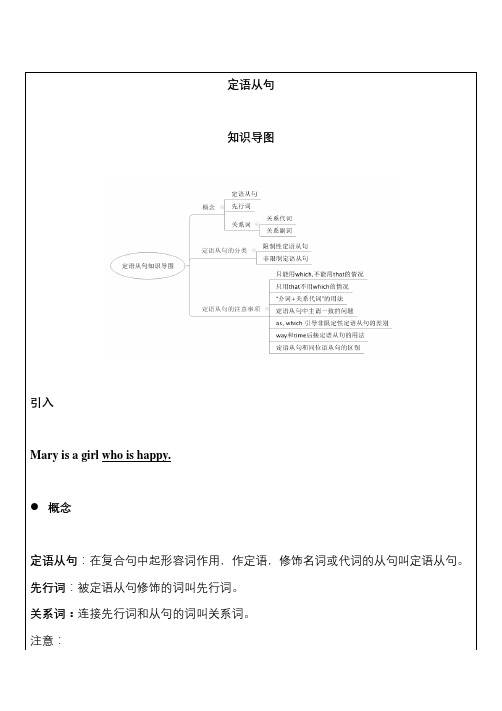
when=on/in/at/during等介词
+which
地点
where
地点状语
This is the room where he put up for the night.
这就是他渡过夜晚的那房子。
where=in/at/on/under等介词
+which
Whois the person that is standing at the gate?站在门口的那个人是谁?
3)“介词+关系代词”的用法
有时定语从句中的介词可以提到关系代词前面,形成“介词+关系代词”结构,该结构中的关系代词可用which, whose, who不可以用that和who。该结构中的介词可以根据定语从句中谓语的搭配、与先行词的搭配或者句子的意义来确定。
as引导的定语从句可置于句首、句中、句末,而which不可。
As we all know, he never smokes.
在从句中作主语时,which既可作连系动词be的主语,也可作实义动词的主语;而as只可作连系动词be的主语。
He marriedher,which/as was natural.他和她结婚了,这是很自然的事。
whose在从句中做定语
指某人时,也可以用
…of whom/ the+名词+of whom
代替whose
指物时也可以用,
…of which/the+名词of which
代替whose
as
主、宾、表
This is the same book as I lost yesterday.
这本书与我昨天丢失的那本书一样。
- 1、下载文档前请自行甄别文档内容的完整性,平台不提供额外的编辑、内容补充、找答案等附加服务。
- 2、"仅部分预览"的文档,不可在线预览部分如存在完整性等问题,可反馈申请退款(可完整预览的文档不适用该条件!)。
- 3、如文档侵犯您的权益,请联系客服反馈,我们会尽快为您处理(人工客服工作时间:9:00-18:30)。
必修一语法点一:Be+v.ing表将来 use the present continuous tense for future plans In English, we have lots of ways of talking about the future. The most common ways of talking about the future we encounter use ‘will’ or ‘be going to’ followed by an infinitive(动词原形), and we tend to use ‘be going to’ most often for talking about future plans. Sometimes, we also use the present continuous tense to talk about future plans.Ex. ①we are going to Mexico next Sunday.② Are you coming to the cinema?③ He is leaving for London in two hours.④ We are spending next winter in Australia.Only some verbs can be used in this situation, such as: go, arrive, come, leave, start, stay, return, play, have, work, wear, spend, see, meet, etc.扩展:What’s the difference between using ‘be going to’ and the present continuous to talk about future plans? Let’s look at some more examples:“I’m going to play football on Saturday”You have made a plan in your head but possibly not taken any real action to confirm it. Also, playing football on Saturday is probably not a regular event for you.“I’m playing football on Saturday”You have made a plan and taken some real action to confirm it (e.g. called your friends or booked a place to play). In this case, it’s likely that playing football on Saturdays is a common activity for you.语法点二:Direct speech and indirect speech(直接引语和间接引语)Let's first define the terms, then look at how to talk about what someone said, and how to convert speech from direct to indirect or vice-versa.You can answer the question What did he say? in two ways:by repeating the words spoken (direct speech)by reporting the words spoken (indirect or reported speech).Direct speech repeats, or quotes, the exact words spoken. When we use direct speech in writing, we place the words spoken between quotation marks (" ") and there is no change in these words.Reported or indirect speech is usually used to talk about the past, so we normally change the tense of the words spoken. We use reporting verbs like 'say', 'tell', 'ask', and we may use the word 'that' to introduce the reported words. Quotation marks are not used.1、declarative sentence陈述句①Change in pronoun:The pronoun (subject) of the reported speech is changed according to the pronoun of reporting verb or object (person) of reporting verb (first part of sentence). Sometimes the pronoun may not change.In following example the pronoun of reported speech is “I” w hich will bechanged in indirect speech into the pronoun (Subject) of reporting verb that is “he”.He said, “I like it very much.”→He said that he liked it very much.②Change in tense: If the first part of sentence (reporting verb part) belongs to past tense the tense of reported speech will change. If the first part of sentence (reporting verb part) belongs to present or future tense, the tense of reported speech will not change.③Change in demonstrative pronoun指示代词, temporal adverbial时间状语, adverbial of place地点状语 and verbs.Ps:(1)if the direct speech indicates objective truth, then there is no change in tense when it’s converted to indirect speech.Ex. He said, “Light travels much faster than sound.”→He said that light travels much faster than sound.(2) 如果在当地转述,here不必改成there,come不必改为go,如果在当天转述,yesterday, tomorrow等时间状语也不必改变。
2、imperative sentence祈使句Imperative sentences do not normally have an expressed subject. In order to change an imperative sentence into the indirect speech, we use a to-infinitive.Note that instead of ‘said’ we use one of the following reporting verbs: Ask, Tell, Advise, command, request, order, forbid, decree, propose etc.If the imperative sentence is in negative form, then add ‘not’ in front of to-infinitive when convert the speech.Ex.①The hostess said to us, “Please sit down.”→The hostess asked us to sit down.②He said, “Don’t make so much noise, boys.”→He told the boy s to not to make so much noise.3、interrogative sentence疑问句Turn word order in interrogative sentence into that in declarative sentence, and use a full stop in the end. The subject, tense, adverbial etc have to change accordingly.(1)general question一般疑问句General questions are changed into the indirect speech by using the connective if or whether. The reporting verb say or said changes to ask or asked.Ex. He said, “Are you interested in English?”→He asked (me) if I was interested in English.(2)special questionSpecial questions are changed into the indirect speech by using the same interrogative.Ex. “W hat do you want?” he asked me.→He asked me what I wanted.语法点三:The Attributive Clause定语从句Attributive clause is a sentence that is used to modify a noun or a pronoun to make clear which person or thing we are talking about.Ex. The man who lives next to us sells vegetable.You must do everything that I do.In the two examples above, man and everything are called antecedents先行词. Who lives next to us and that I do are attributive clauses. Who and that are relative pronoun关系代词. The words to connect main clause and attributive clause are divided into two groups, they are relative pronouns, namely that, which, who, whom, whose, and relative adverbs, namely where, when, why.Relative pronouns: We use who and whom for people, and which for things. We use that for people or things.1.That, which, who2.WhoseWhose replaces a genitive noun名词所有格in an attributive clause. The antecedent can be thing or person.Ex. This is the scientist whose name is known all over the world.The room whose window faces south is mine.3.When, where, whyFirst, when the antecedent is about reason, and it acts as an adv in the attributive clause, we will use “why”. Second, when the ante cedent is about time, and it plays the role of an adv,“when” will be used. Third, when the antecedent is about place, playing the role of an adv of place, we will consider adopting where.必修二语法点一:(接定从讲)4.The restrictive and non-restrictive attributive clause.限制性和非限制性(1)Restrictive clauses limit the possible meaning of a preceding subject. They areusually not marked by pauses in speech, and they are not set off by commas in writing. Sometimes the relative pronoun which serves as an object in clause can be omitted.Ex. What is the name of the tall man who just came in?Beijing is a city (that) I’ve always wanted to visit.He has found the book (that) he was looking for.(2)Nonrestrictive clauses tell you something about a preceding subject, but theydo not limit, or restrict, the meaning of that subject. They are usually marked by brief pauses in speech and are usually set off by commas in writing. Relative cannot be omitted.Ex. Beijing, which is the capital of China, has a very long history.Yesterday I met Li Ping, who seemed to be very busy.Ps: ①In restrictive attributive clause, relative adverbs behind time or place sometimes can be omitted in spoken English.Ex. That was the year (when) I first went abroad.We need a place (where) we can stay for a few days.②Why clause can only modified ‘reason’ and it can be converted to ‘for which’. In spoken English, we can also use ‘that’ or just omit the relative.Ex. The reason (why/for which/that) I bought the roses is that Mary likes them.③‘How’ cannot be used as relative adverbs. We use in which, that, or no relative to modify ‘way’.Ex. This is the way (how) I did it. (wrong)This is the way(in which/that) I did it. (correct)④the attributive clause can also be called as relative clause.语法点二:The passive voiceWe have learned the passive voice of the simple present tense and simple past tense.1.The simple future tense (use ask as an example)Ps: affirmative form; negative form; interrogative form2.The present perfect tense3.The present continuous tense4.Phrasal verb短语动词Normally, only transitive verbs can be used in passive voice, but with the addition of preposition or adverb to intransitive verbs, some phrasal verbs serve as transitive verbs, so they have passive voice too. Pay attention, we can’t missany part of phrasal verb when we change it into passive voice.At last they put out the fire. → At last the fire was put out.They will put up a notice on the wall. → A notice will be put up on the wall.Have you sent for a doctor? → Has the doctor been sent for?Ps:必修三语法点一:modal verbs情态动词A modal verb is a type of verb that is used to indicate modality – that is: likelihood, ability, permission, and obligation. They have to be used with infinitive.Can-could may-might shall-should will-would have to-had to must1.Can & couldThey can be used to indicate ability, permission, possibility, etc.Ps:Possibility:We use the modal can to make general statements about what is possible: It can be very cold in winter. (= It is sometimes very cold in winter)We use could as the past tense of can:It could be very cold in winter. (=Sometimes it was very cold in winter.)We use could to show that something is possible in the future, but not certain: If we don’t hurry we could be late. (=Perhaps/Maybe we will be late)We use could have to show that something is/was possible now or at some time in the past:It’s ten o’clock. They could have arrived now.Permission:We use can to ask for permission to do something or give permission; could is more formal and polite than can.2.May & mightPs: The negative forms are may not and might not.We use may:①when we are not sure about something:Jack may be coming to see us tomorrow.② to make polite requests:May I borrow the car tomorrow?③When we use may not for a refusal it is emphatic:You may not borrow the car until you can be more careful with it.We use might:①when we are not sure about something:I might see you tomorrow.It’s quite bright. It might not rain today.②As the past tense of may for requests:He asked if he might borrow the car.③For very polite requests:Might I ask you a question?3.Must & have toPs:Must①We use 'must' to express a strong obligation. When we use 'must' this usuallymeans that some personal circumstance makes the obligation necessary (and the speaker almost certainly agrees with the obligation.). Its negative form is must not, but when we answer a must question, we use need not or don’t have to.②We can use 'must' to show that we are certain something is true. We are makinga logical deduction based upon some clear evidence or reason.Have toWe can also use 'have to' to express a strong obligation. When we use 'have to' this usually means that some external circumstance makes the obligation necessary. But must indicate the speaker’s subjective opinion, have to refers to objective one.4.Shall & should5.Will & would6.oughtOught to is a semi-modal verb because it is in some ways like a modal verb and in some ways like a main verb. For example, unlike modal verbs, it is followed byto, but like modal verbs, it does not change form for person. The negative is formed by adding ‘not’ after ought (ought not to).语法点二:Noun clausesA noun clause is a clause that plays the role of a noun. The object clause, the predicative clause, the subject clause, the appositive clause同位语从句.1.The objective clauseIt is a clause that functions like a noun object. It begins with conjunctions that, if, whether, conjunctional pronoun who, whose, what, which and conjunctional adverbs when, where, how, why, etc.2.The predicative clauseIt is a clause that functions as the predicative. It begins with conjunctions that, as if, whether, conjunctional pronoun who, what, which and conjunctional adverbs when, where, how, why, etc.3.Subject clauseIt is a clause that functions as the subject. It begins with conjunctions that, whether, conjunctional pronoun who, what, which and conjunctional adverbs when, where, how, why, etc.4.The appositive clauseIt’s a clause serves as the appositive to explain the preceding noun, which usually are fact, idea, news, promise etc. It begins with conjunction that, conjunctional adverb how, when, where, etc.必修四语法点一:Agreement between subject and verb主语和谓语动词的一致1.Subjects and verbs must agree in number and person.2.If two subjects are joined by ‘and’, they typically require a plural verbform.3.Do you use a singular or plural verb to match a collective noun such as team orstaff? The answer is, it depends. If these nouns are acting as a unit, use a singular verb. If the sentence indicates more individuality, use a plural verb.My family is a large one.The family are sitting at the breakfast table.This group is having a meeting.Our group are reading the newspapers.4.When indefinite pronoun like anyone, anybody, anything, everyone, everything,someone, somebody, something, no one, nobody, nothing, each, the other, etc serves as the subject, use a singular verb.Is anybody going to tell him the news?There is nobody in the house.Everything is ready.5.Pronoun ‘none’ and ‘neither’ can use either singular verb or plural verband it depends on speaker’s intention.But when ‘none’ and ‘neither’ stand for uncountable noun, they are considered as singular; when neither functions as an adjective to modify a singular noun, the predicate verb should be singular.6.The verb in an ‘or’, ‘either…or’, ‘neither…nor’ or ‘not only…but also’sentence agrees with the noun or pronoun closest to it.Either you or Jane is to be sent to New Zealand.Neither he nor I have finished the experiment.7.In sentences beginning with here or there, the true subject follows the verb.There are four hurdles to jump.There is a high hurdle to jump.Here are the keys.8.Sometimes the subject is separated from the verb by such words as with, alongwith, together with, as well as, like, except, besides, including, in addition to, etc. These words and phrases are not part of the subject. Ignore them and use a singular verb when the subject is singular.The teacher with two students was at the meeting.The girl as well as the boys has learned to drive a car.9.Plural nouns that indicates time, money, distance, weight is considered as awhole when they are used as the number of a unit, so the predicate verb should be singular.Sixty years is a long time.Ten dollars is enough for him.Three thousand miles is a long distance.语法点二:the verb -ing formSubject, object, predicative, attribute, object complement, adverbial语法三:构词法word formationpounding 合成2.Conversion 转化The characteristic of a certain word词性3.Derivation 派生Prefix前缀,suffix后缀,root词根Dis, un, in, im, non, mis, re, en, able, al, er, or, ess, less…必修五语法点一:verbsThe past participle语法点二:inversion倒装Inversion happens when we reverse (invert) the normal word order of a structure, most commonly the subject-verb word order. For example, a statement has the subject (s) before the verb (v).1.QuestionTo make question word order, we invert the subject and the verb, with an auxiliary (aux) or modal verb (m) before the subject (s)What do I need to take with me?2.There beThere are some flowers on the table.3.Direct speech, sometimes“Is it ready yet?” asked Hu Xin.4.Inversion can happen after ‘there, here, out, in, up, down, away, in front of,etc’ when it is as an adverb or prepositional phrase of place or direction. It is used for emphasis.Here comes the bus!Here’s your coffee.There goes the bell.5.When we use an adverb or conjunction with negative meaning (e.g. never, not,not only, little, seldom, rarely, scarcely, hardly) in front position for emphasis, we invert the subject (s) and auxiliary (aux)/modal verb.Not only was there no electricity, but also no water.Never will he forget his first time to take a place.Hardly had I got out of the house when it began to rain.6.Only in front.Only then did I begin my work.Only in this way can you learn from your friends.7.So, neither, norMy sister enjoys travelling. So do I.I don’t know and nor do I care.8.So/such…that. So or such in front.So proud was he that he never listened to any advice.So absorbed was he in the novel that he did not notice his father at the door.9.In sentences for wish.Long live th e People’s Republic of China!May you have a happy holiday!10.When ‘if’ is omitted in a subjunctive sentence.Should you need more information, please let me know. (=if you should need more information, please let me know.)Had Mark invited me, I would have been glad to come. (=If Mark had invited me, I would have been glad to come.)语法点三:省略Ellipsis选修6语法点一:the subjunctive mood虚拟语气In a sentence, the grammatical mood conveys the speaker’s attitude about the state of being of what the sentence describes.1.the indicative mood陈述语气The indicative mood is used to make factual statements, ask questions, or express opinions as if they were facts. Any verb tense may be deployed in the indicative mood.2.the imperative mood祈使语气A sentence in the imperative mood expresses commands or requests. It indicates that the speaker desires for the action expressed in the sentence to take place. In most imperative sentences, there’s an implied you.3.the subjunctive mood虚拟语气The subjunctive mood is the verb form used to express a wish, a suggestion, a command, or a condition that is contrary to fact.①‘I f ’ in conditional clauses②In objective clause1)After ‘wish’Use past tense to indicate the condition at present, past perfect tense to indicate the condition in the past and would/could/might + infinitive to indicate condition in future.He wishes he could paint as well as a professional artist.I wish I had been with you yesterday.We wish the rain would stop2)After ‘would rather’Use past tense to indicate the conditions at present or in future and past perfect tense to indicate conditions in the past.I would rather you did it.I would rather you hadn’t told me the truth.3)After ‘demand, suggest, order, propose, request, command, insist’, etc.Use should + infinitive or just infinitive to express wish, suggestion, command, request, etc. Should can be omitted.John Snow suggested that the source of all water supplies (should) be examined.They requested that the meeting be postponed.③The subjunctive mood can also be used in subject, predicate, appositive clausesand the predicate of the clauses is “should + infinitive” or just infinitive.It’s important that we (should) attend the meeting.It’s a pity that he (should) refuse our invitation.My advice is that she wait till next week.④ the subjunctive mood can be used for wish, curse, prohibition, etc.Long live the unity of the Chinese people!God bless you!语法二:the use of “it”1.Pronoun it①To replace the things that have been mentioned before.My pen is missing. I can’t find it a nywhere.②Replace demonstrative pronouns like this and that.A: Whose umbrella is that?B: It’s Mary’s.③Used as impersonal pronoun to indicate time, date, place, weather, temperature,distance etc.It’s a beautiful day.2.Introducer引导词①Used as dummy subject to replace the true subject in form of the infinitive,verb -ing form or clauses.It’s no use crying over spilt milk.It’s difficult to give up smoking.②Used as dummy object to replace the true object in form of the infinitive, verb-ing form or clauses.I think it best that you should do more exercise.He found it difficult to do homework.③We use it in cleft sentences. It emphases the subject or object of the mainclause. It is (was) + stressed constituents + that (who/whom) + other constituents.It’s human activity that has caused this global warming.It was Jim Brown who/whom/that you should ask.选修七语法点一:verbsThe infinitive动词不定式1.Perfect infinitiveTo+ have + past participle2.Passive infinitiveTo + be + past participle3.When “to” is omitted in the infinitive in active voice, it must re-appear inpassive voice.The passive -ing form语法点二:the attributive clauseSome conditions that which can’t be used in the attributive clause1.When antecedents are indefinite pronouns like ‘all, little, much, few,everything, anything, nothing, none’, etc, the relative pronoun can’t be which but that.All that I want is your voice.There is not much that can be done.2.When antecedents are modified by superlative adjectives形容词最高级, therelative pronoun can’t be which but that.This is the funniest film that I have ever seen.3.When antecedents are modified by ordinal number序数词, the relative pronouncan’t be which but that.This is the first time that we have met.4.When antecedents are modified by ‘the only, the very, the same, the right’,etc, the relative pronoun can’t be which but that.American audiences will see the same movie that was shown in Asia.5.When antecedents are modified by ‘all, every, any, much, little, few, no’,etc, the relative pron oun can’t be which but that.All the things that you told me are lies.6.When the main clause is a special question that starts with ‘which, who, what’,the relative pronoun can’t be which but that.Who is the girl (that is ) sitting by the lake?Which of those books (that are )on the table belong to you?选修八语法点一:verbsTenses语法点二:the appositive同位语An appositive is a noun, a noun phrase, or a noun clause which sits next to another noun(fact, idea, news, doubt, decision, possibility, assumption, question, etc) to rename it or to describe it in another way. It’s usually introduced by that, but sometimes what, why, whether, when, etc are ok.词性 part of speech实词 notional word虚词 structural word派生词 derivative [di'rivətiv]复合词 compound [ˈkɔmpaund]专有名词 proper noun集体名词 collective noun系动词 link verb助动词 auxiliary verb [ɔ:g'ziljəri]情态动词 modal verb不规则动词 irregular verb使役动词 causative verb感官动词 verb of senses感叹词 exclamation [.eksklə'meiʃən]人称代词 personal pronoun物主代词 possessive pronoun反身代词 reflexive pronoun [ri'fleksiv]指示代词demonstrative pronoun [di'mɔnstrətiv]不定代词 indefinite pronoun名词性物主代词 nominal possessive pronoun 形容词性物主代词adjectival possessive pronoun [.ædʒik'taivəl] 不定冠词 indefinite article基数词 cardinal numeral序数词 ordinal numeral原形 base form名词性从句 nominal clause定语从句 attributive clause宾语从句 object clause主语从句 subject clause同位语从句 appositive clause时间状语从句 adverbial clause of time地点状语从句 adverbial clause of place方式状语从句 adverbial clause of manner让步状语从句 adverbial clause of concession 原因状语从句 adverbial clause of cause结果状语从句 adverbial clause of result目的状语从句 adverbial clause of purpose条件状语从句 adverbial clause of condition 简单句 simple sentence陈述句 declarative sentence [di'klærətiv] 一般疑问句 general question特殊疑问句 special question选择疑问句 alternative question附加疑问句tag question反意疑问句disjunctive question [dis'dʒʌŋktiv]存在句existential sentence [.egzis'tenʃəl]肯定句 positive sentence否定句 negative sentence祈使句 imperative sentence省略句 elliptical sentence [i'liptikəl]感叹句exclamatory sentence [ik'sklæmətəri]句子成分 members of sentences谓语 predicate ['predikeit]直接宾语 direct object间接宾语 indirect object补语 complement主补 subject complement宾补 object complement表语 predicative定语 attribute同位语 appositive分词 participle不定式 infinitive [ɪnˈfɪnɪtɪv]所有格 possessive case过去将来时 past future tense过去将来进行时past future continuous tense [kənˈtɪnjuəs]过去将来完成时 past future perfect tense一般现在时 simple present tense一般过去时 simple past tense一般将来时 simple future tense过去完成时 past perfect tense现在完成时 present perfect tense将来完成时 future perfect tense现在进行时 present continuous tense过去进行时 past continuous tense将来进行时 future continuous tense现在完成进行时present perfect continuous tense过去完成进行时 past perfect continuous tense 主动语态 active voice被动语态 passive voice虚拟语气 subjunctive mood全部否定 full negation局部否定 partial negation全部倒装 full inversion部分倒装 partial inversion直接引语 direct speech间接引语 indirect speech主谓一致 subject-predicate agreement就近原则 principle of proximity意群 sense group语音 pronunciation / speech sound连读 linking of sounds语调 intonation升调 rising tone降调 falling tone同义词 synonym反义词 antonym记叙文 narrative writing [ˈnærətiv]议论文argumentative writing [ˌɑ:ɡjuˈmentətiv]说明文 expository writing [ɪk'spɒzitəri] 应用文 practical writing逗号 comma冒号 colon [ˈkəʊlən]分号 semicolon问号 question mark感叹号 exclamation mark [ˌekskləˈmeɪʃn]连字号 hyphen [ˈhaɪfən]引号 quotation marks音标 phonetic transcription元音 vowel单元音 single vowel双元音 diphthong [ˈdɪfθɒŋ]辅音 consonant清辅音 voiceless consonant 浊辅音 voiced consonant上唇 upper lip 下唇 lower lip齿龈 alveolar ridge [ælˈviələ] 舌尖 tongue tip声带 vocal cords。
